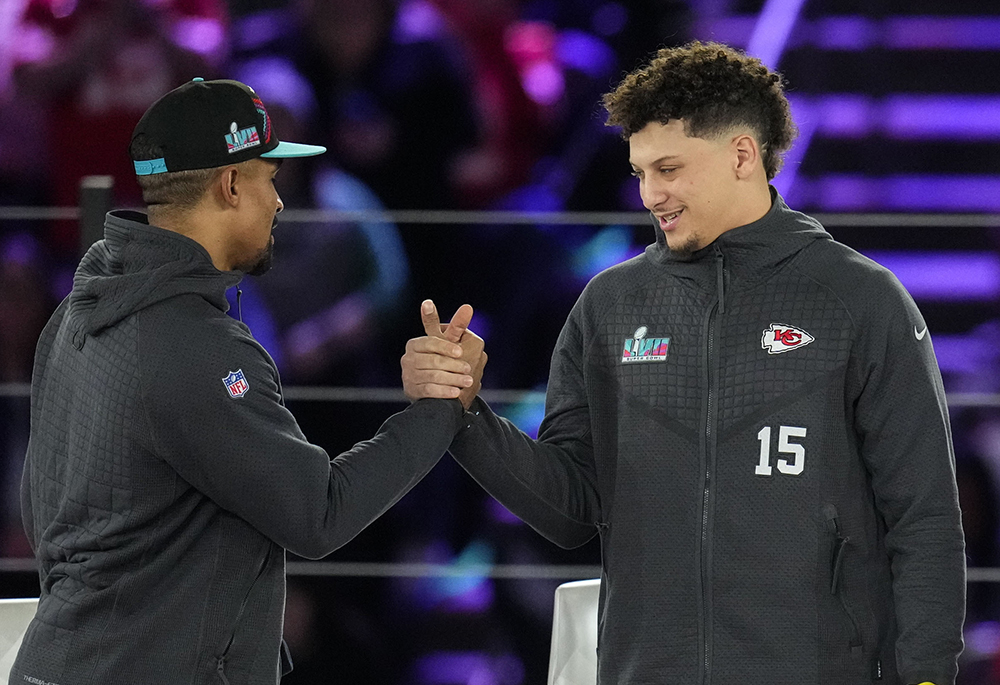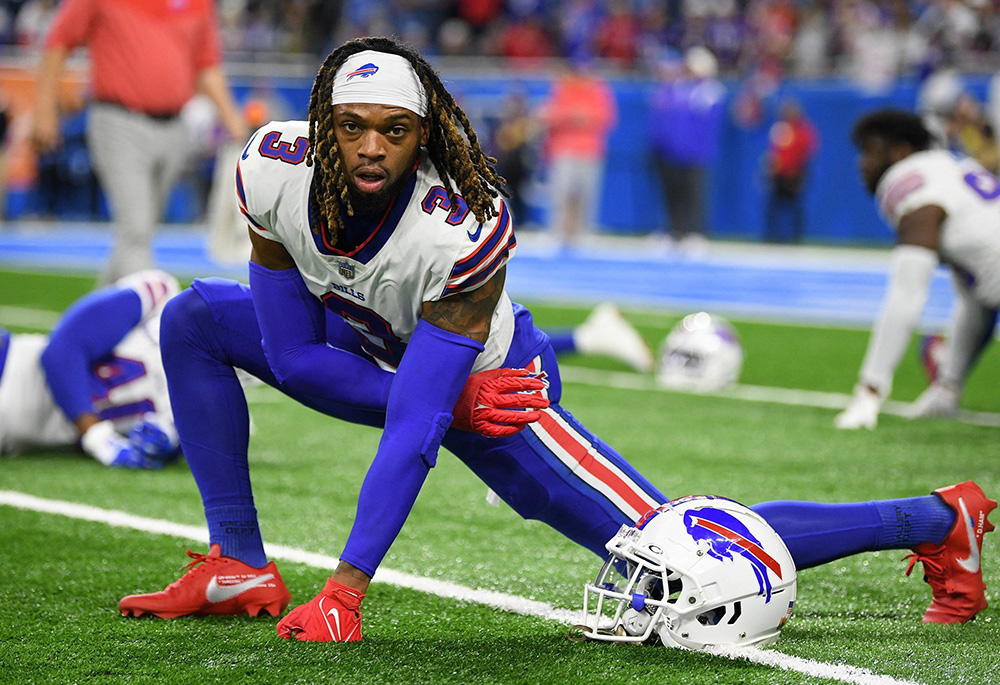
Philadelphia Eagles quarterback Jalen Hurts, left, and Kansas City Chiefs quarterback Patrick Mahomes shake hands during the NFL football Super Bowl 57 opening night, Monday, Feb. 6, 2023, in Phoenix. The Kansas City Chiefs will play the Philadelphia Eagles on Sunday, Feb. 12. (AP photo/Ross D. Franklin)
Even if you don't watch much football, even if you'll pay more attention to the Super Bowl commercials or halftime show than to the game this Sunday, or if you plan on skipping the game entirely, you probably saw what happened to Buffalo Bills safety Damar Hamlin last month.
In Buffalo's Jan. 2 game against the Cincinnati Bengals, Hamlin tackled Bengals wide receiver Tee Higgins, absorbing a blow from Higgins' shoulder into his own chest. It seemed like a normal play, and Hamlin got up from the turf to his feet. But just a second later, he passed out and fell backward.
Paramedics and team trainers rushed to his aid, administering CPR for about 10 minutes right there on the field. He was eventually removed from the stadium in an ambulance. Later, we would learn that Hamlin suffered cardiac arrest and his life had very much been in danger. Thanks to the trained cardiac response team on call at every NFL game, plus the heroic work of paramedics and medical team at the University of Cincinnati Medical Center, Hamlin's life was saved. After some immediate foot-dragging by the NFL, the remainder of the game was postponed and never finished.
In the days after the horrific injury, there was a huge amount of reporting about Damar Hamlin the person. He is deeply devoted to his family and hometown, someone who lights up any room he walks into. A toy drive for kids from his hometown that Hamlin launched in 2020 with a $2,500 goal was found online after his injury and has now raised over $9 million. He is an inspirational person whom I had never heard of before his injury.

Buffalo Bills safety Damar Hamlin warms up before a game against the Detroit Lions at Ford Field Nov 24, 2022. Catholics are rejoicing in answered prayers after Hamlin made a dramatic recovery following cardiac arrest in a Jan. 2 NFL game. (OSV News photo/USA Today Sports via Reuters/Lon Horwedel)
All this attention underlined an essential point we fans often forget: The players we enjoy watching are real human beings, not faceless sources of our entertainment. American football so often obscures this truth, in large part through the very structure of the game. There are 22 players on the field at any given time, making individual performances outside of the quarterback and other skill position players difficult to follow; players' helmets hide their faces from spectators; and the average NFL career length of three years means the majority of players come and go without much notice.
Of course, injuries are the main driver of football's extremely short career span. Over the past decade, the brain condition chronic traumatic encephalopathy, or CTE, that appears in ex-football players with alarming frequency due to countless subconcussive hits to the head has justly gotten the most media attention. Those headlines had just begun to fade, but Hamlin's cardiac arrest shone a spotlight on player safety once again.
Some of the most powerful media commentary after the near-tragedy came from former players describing the uncertainty NFL athletes face. Most NFL contracts are non-guaranteed, including Hamlin's. Injured players are often unceremoniously cut and not paid for the remainder of the games on their contract. It takes three seasons for a player to qualify for pension benefits and also three seasons for the five years of post-retirement health insurance to kick in. Further, the NFL is infamously stingy with disability payouts, with one former player referring to the league's strategy as "delay, deny and hope we die."
Advertisement
The game's nonstop cascade of life-altering injuries, plus the NFL's bad behavior it knows it can get away with because it's a monopolistic juggernaut running the country's favorite sport, have forced a number of fans to walk away forever.
I admire the conviction of these fans and might someday join them. But I wouldn't bet on it. The sport is incredible to watch, a marriage of chess-like strategy and absurd feats of athleticism that you can't find anywhere else. I'll be watching the Super Bowl on Sunday, rooting for my Philadelphia Eagles. Will I feel some guilt for entertaining myself while those on the field play a sport that inherently poses such risk to their health? Yes, probably. But I won't turn the TV off.
What can fans do? Television producer and author of a book on ethics Michael Schur reflected on this question on a recent episode of the podcast he co-hosts with sportswriter Joe Posnanski. Schur wrestles with the ethical compromises he feels he's making by watching the sport but, like me, hasn't been able to quit it. His suggestion for those of us fans who find it "hard to rip [football] out of [our] soul and throw it in the garbage for good"? Support the players, support the players, support the players.
From a Catholic perspective, papal teaching on the dignity of work and rights of workers leads us to side with laborers who are in danger on the job. But at most that's a vague supportive feeling we might have when we hear about players going on strike. Maybe it leads us to make a social media post or to defend players when friends or family members complain about the "entitlement" of professional athletes. Nice enough, but that's not a real impact.
Unless there is an organized movement of fans with an honest commitment to walking away from our fandom if the players aren't treated better, then nothing will change. The NFL does not care about bad PR; the league is too powerful and popular. Pro football games made up 45 of the top 50 most-watched sporting events in the U.S. in 2022, and the game is skyrocketing in popularity in Europe.
Frankly, I'm not optimistic that justice for workers will come in this case. I can only hope that stories like that of Damar Hamlin — a person who reminded us that he is more than his athletic abilities, worthy of being treated with dignity on the job — changes the conversation and our priorities for good.







